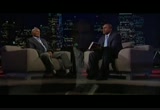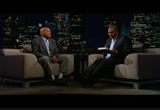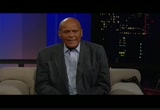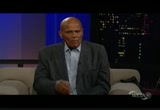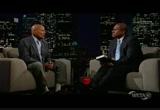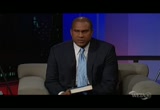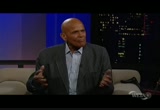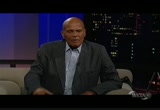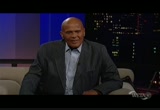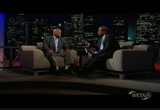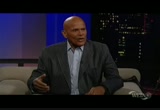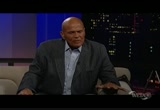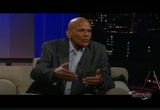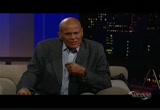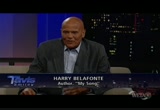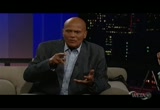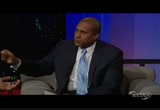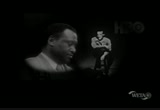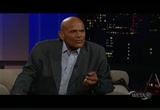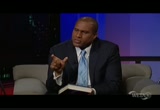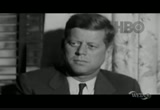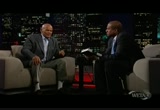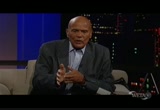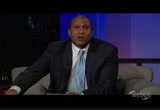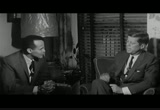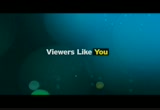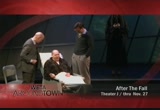tv Tavis Smiley PBS December 1, 2011 12:30am-1:00am EST
12:30 am
tavis: good evening. from los angeles, i am tavis smiley. tonight part one of a conversation with hair belafonte -- harry belafonte. he has a new memoir called "my song: a memoir." we're glad you have joined us for the first night with harry belafonte coming up right now. >> every community has a martin luther king boulevard. it's the cornerstone we all know. it's not just a street or boulevard, but a place where walmart stands together with your community to make every day better. >> nationwide insurance supports tavis smiley. with every question and every answer, nationwide insurance is proud to join tavis in working to improve financial literacy and remove obstacles to economica nt ernv sation at a time.
12:31 am
nationwide is on your side. >> and by contributions to your pbs station from viewers like you. thank you. [captioning made possible by kcet public television] tavis: i am always pleased and honored to welcome harry belafonte to this program. despite of all of his attack alert -- accolade's we will roll in his commitment to justice in this country and around the world. if you have not seen the terrific documentary about his life currently playing every day on hbo, he is also allen now with a new memoir called -- out
12:32 am
now with a new memoir called "my song: a memoir." are you doing all right? >> i say i am hanging on. better than hanging up. tavis: you will never do that. i am glad you said that syria did you give me these great segues into a conversation i wrote this down. i love this line in terms of how on you open the text about your childhood. you say, "i was born into poverty and for a long time poverty was all i thought i would know. it defined me in the depths of my soul. " speaking of never giving up, particularly given where you started, how does poverty still
12:33 am
define you? >> first of all, poverty continues to exist. it appearance seems to be relentless not only all of the things in america but also globally. we are over 7 billion people on earth. i do not see any philosophical analysis that suggests we know how to get out of this. what we need to do, people are not prepared to commit themselves even those who want to be outside of this oppression everyone is experiencing. nobody wants to step in and stopped the machine that perpetuates this relationship to poverty. many who have nothing as opposed
12:34 am
to the few who have everything. as long as these disparities remain between people and forces, i think we will be in a perpetual state of a people. i was born into poverty. it was my expectation i would always know it. what i have opted to do since i escaped the harshness balance of poverty, i have stayed connected to it spiritually. i reside and go and social lines and exist among those who suffer daily from the relationship they have to poverty. black men and women who are incarcerated. all people incarcerated, not just black. when i go across the country to
12:35 am
new mexico or alabama or wisconsin, there are always forces at play that i choose to relate to an extract inspiration from. as long as they are against poverty, i find a role for myself. what is going on, for instance, with the occupation of wall street. i find it a natural extension to something i used to do as a daily part of my life not that many years ago. seeing the young people in a mood of rebellion and dissatisfaction seeking to have change and rejecting that which has been offered as the two in emic to really deal with the situation.
12:36 am
i like what these young people are saying and doing. i like the instruments they have used to play out this scenario of nonviolence. i do not think anybody can challenge them about that and succeed. >> the key word to my years in which she is said about relationship to a porter is that you choose to side with the poor. you choose to side with the underprivileged. why that choice? >> because everything i need to talk about, everything i need to review, to engage in bounce off
12:37 am
of, resides in poverty. i am familiar with it. it is easier to do with whether i am in america or africa. wherever i go and find the environment of those who are living in poverty and resisting poverty. in that environment i find great inspiration. many of the men and women who are a an inspiration are filled with inspired moments to overcome oppression. i do not find that on wall street or beverly hills. in places where opportunity resides unbridled. i think the real creative energy is where people are caught in an economic abyss. tavis: how much of who you are
12:38 am
has to meet growing up with a jamaican immigrant? >> everything comes from that fact. it was my formative years, when i left harlem with my mother who was an immigrant woman coming to america to find that generosity of the american dream and discovering that was not available to her. it was her taking us back to the island of jamaica until i was 12. i was shaped by that culture, the economy, and my people who are plantation workers and harvested those crops and took them to the boats run by the company to load a those ships at night. hansel of the songs that i sing. what i admired about it, as
12:39 am
posit -- poverty-stricken as we were, it was the cunning that we emerged from this social scenario. i admired the way people survived. how brilliant the were able to move the chess pieces of life against the onslaught of depravity and denial they were constantly facing. through them my discovered my own center -- i discovered my own center. i learned where one had to be short and where one had to be tall. play that game all day long. i am still in the place where that goes on. most of the men and women that i befriend and run with and speak to are all people in that environment. tavis: let me ask how it is,
12:40 am
there is so much to get into. i said to my friend yesterday that the persons i know who have lived the most life, harry belafonte and quincy jones. we would get back to all of the white you have done and a second, but for those who are hearing you grew up in this country the son of jamaican immigrants with all of the controversy of immigrants and their role in this society, what you say to people who might be of the notion that for a guy who grew up in this country as the son of immigrants, he is mousse with his lips when it comes to rebuking this country. you do not hold your tongue when you think something ought to be said.
12:41 am
link those things for me. >> first of all, i am who i am despite what america has put before me. i am chu lai and despite the obstacles we have faced based upon race and humiliation. i am not here because i am inspired by what great presidents have done or not done. i am here because i come from a sense of struggle, of using the instruments that were given to me to manipulate the environment in which i found myself and join with those who are equally skillful at manipulating that environment. i think america offers a dream
12:42 am
that cannot be fulfilled as easily as anywhere else in the world. great men, dubois, doctor king and others saw opportunity that did not reside the same elsewhere. opportunity for black people in africa was different under the colonial oppression. just as it was different for those who grew up in the caribbean. it gave us the opportunity to see the world and dimensions we did not see it growing up in any one place. i think to be born in america and growing up with the american boundaries of race and race oppression is a different experience than that in the
12:43 am
caribbean or those in africa. our experience has not made us monolithic. we are not of the same stripe with the same sense of what the tactics have to be to survive. i had a great reservoir to draw from because all of the people i met at the dawning of african independence, the waiver of sovereign states that has emerged to become gonna = -- ghaana and all the rest, those are friends and neighbors i met coming from the same experience. these men were soon to become head of state and designers of a history that was unique to the continent. to move among them and hear their points of view.
12:44 am
i came back and took at the mayor -- took a look at american foreign policy and saw how much we thrived off of oppression of the people of africa. how we had conquered that environment. how we robb to the people of their rights -- robbed the people of their rights, their material rights. america was the place more critical to do with in trying to change the way in which the systems work. if i can change america and american foreign policy and help get people into office to bring a moral mission as well as a spiritual insight into what they should be doing, we sit in a place where the opportunity for change resigns -- resides, it
12:45 am
is like -- unlike anyplace. tavis: pushing america makes you a greater patriot or any great? -- an ingrate? >> i do not dwell too much in the minds of others. [laughter] early on when the response was filled with such an immense because i backed nelson mandela and they were defined as communists and terrorists and people who were filled with negativity, everyone i saw who they were denouncing were the people to whom i was attracted. eleanor roosevelt. when they first branded a communist, i was supposed to have felt horror. i did not feel that.
12:46 am
i felt annointed. all of the communists or people defined as such, they became my wish list for people i wanted to be like. to follow their path and be influenced by their mission curiou. this carried me everywhere i went. they were upset with nelson mandela and others. every time i looked around for what made us the most upset, it was the people who were most impressed. tavis: when you use to the communist word, -- used the
12:47 am
communist word, you said you were hanging on. when one is a free black man, to your point, you express yourself when you want to. there is a price to pay for that. people pushed back and challenge you in a variety of ways. i know how i feel as your friend when i hear people say things about you. not a you need help from me but i always have your back. >> i need all the help i can get. >> i know who -- tavis: ino people who are dismisses of -- i know people who are dismisses of view. what did you do for your friend paul robeson? he got maltreated in every imaginable way. he is your mentor.
12:48 am
>> it was the way in which he treated his mistreatment. the way he handled all of those things they threw at him. i saw this man as uniquely courageous. there were no romantic trappings. i looked at him and i listened to him. each day that i heard my own horror stories, he is one of the people i would go to to discuss, how does one handle an environment that does the kinds of things that were being done to me in so many others. his guidance, i found a way in which to manipulate my own experience through his eyes and his courage. how he went out pure. he went our hard, but noble and
12:49 am
with dignity. he went out heroic. all of these things attested to the fact that this man possessed guts. human kindness. human power. to follow his path and to listen to his council was the reward of my journey, not the anguish of it. what angers me is that we were not more successful at saving him from so much cruelty. through that sacrifice and experience, as much as dejesus has inspired christianity and to the teachings, so am i touched by mandela and doctor king and by these figures who are quite
12:50 am
christ-like. in their sacrifices and in their moral strength and moral center. they find a motive for their lives in the moral choices they make on what to do with life. tavis: there are two people who come to mind, i count myself as one of them. for the purpose of this conversation, there are two people who come to mind who you helped push to find their moral compass, to find their center. for all of the hubbub, there are books about jack kennedy. i was reading one the other day taking on chris matthews and others for the deification of jfk. they both started out on the wrong side of the civil rights question. their exposure with you and
12:51 am
others helped to push them toward his better self. talk to me about the role you played in exposing them to find their own moral compass. >> bobby kennedy and john kennedy was troubling to those of us caught up in the adventure of the civil rights movement. from a technical point of view, everything we wanted to do was dependent on the federal government. the laws that oppressed us the most severely were laws of the state. the only thing that were supreme to the laws of the state were that of the federal government. the constitution. you had to abide by the tenants of the constitution. or you will not be permitted to have these rights. therefore the only tools we had
12:52 am
that came from the nation, from the state, was the federal law. people who were the caretakers of that law was the president of the united states who could write things into law or into execution of the law. and there was a person at the justice department, bobby kennedy, whose job was too tense to the rights of the people of the nation. so that we are not violating the constitution. from a practical point of view, that is what we had to do with whether we liked them to not. -- or not. doctor king said we had to find the good in them. after listening to the analysis league game at night -- we gave night after night, we concluded
12:53 am
that there is good in these men, especially bobby kennedy. he must go out and find his moral center and win him to our cause. if he has a moral center, we can find it. and if you join our cause we would have one of the most powerful forces on our side. the conditions were never adversarial constantly. there were a few moments but we quickly looked for healing in order to get on with things. there was a bigger responsibility than s it as individuals. in the beginning it was difficult. i was a victim of mccarthy. not as many as other people like paul and so many others. in this context, bobby kennedy
12:54 am
was a an attorney for the house of un-american activities committee. he was close to joseph mccarthy who was the most villainous of all in the execution of this terrible mandate, this rule on how to treat suspected communists. itavis: hold that thought. we will pick up on that tomorrow night. on how daunting the task was. i'm so delighted that i have you for two nights. you cannot do justice in five or 10 nights but to was better than one. the new book is called "my song: a memoir." if you turn on hbo at any hour, the new hbo documentary about his life. mr. b, i will see you here
12:55 am
tomorrow night. >> my name is harry belafonte. i am an artist. like most americans have an interest in the political destiny of my country. i am sitting here as a negro and i have many questions. >> i want to make it clear that on this question of equality, minimum-wage, better housing, better working conditions, jobs, i stand for these things. >> for more information on today's show, visit tavis smiley at pbs.org. tavis: hi, i'm tavis smiley. join me next time for a conversation with entertainer and icon harry belafonte. that is next time. see you then. >> every community has a martin luther king boulevard. it's the cornerstone we all know.
12:56 am
it's not just a street or boulevard, but a place where walmart stands together with your community to make every day better. >> nationwide insurance supports tavis smiley. with every question and every answer, nationwide insurance is proud to join tavis in working to improve financial literacy and remove obstacles to economic on at a time one conversation at a time. nationwide is on your side. >> and by contributions to your pbs station from viewers like you. thank you.
283 Views
IN COLLECTIONS
WETA (PBS) Television Archive
Television Archive  Television Archive News Search Service
Television Archive News Search Service 
Uploaded by TV Archive on

 Live Music Archive
Live Music Archive Librivox Free Audio
Librivox Free Audio Metropolitan Museum
Metropolitan Museum Cleveland Museum of Art
Cleveland Museum of Art Internet Arcade
Internet Arcade Console Living Room
Console Living Room Books to Borrow
Books to Borrow Open Library
Open Library TV News
TV News Understanding 9/11
Understanding 9/11
